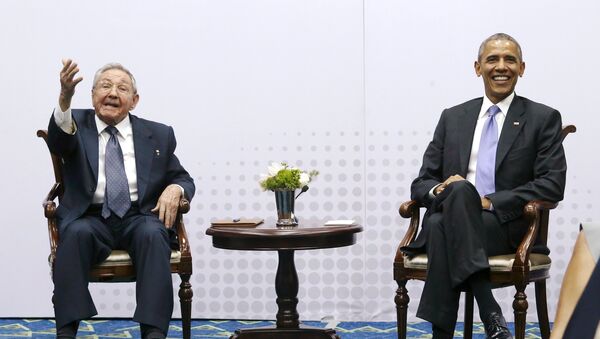WASHINGTON (Sputnik) — Since the United States restored formal diplomatic ties with Cuba in July 2015, Obama has chipped away at the embargo with a series of executive orders that have opened the island nation to US tourists and some business ventures.
The US restrictions on overall trade will remain in place until Congress changes or scraps a 1960 law that put the embargo in place.
"Ending the embargo still represents the most effective way forward," Babson College Economics Professor Kent Jones told Sputnik on Friday.
Jones noted that the US trade restrictions have been an unmitigated failure, unable to topple the regime of revolutionary icon of former President Fidel Castro and his brother, Raul, or isolate his regime.
"Meanwhile the embargo has provided the Castros with a scapegoat for their disastrous economic policies," Jones observed.
Although the issues of human-rights and economic development often swirl in different political spheres, they are inexorably linked when it comes to Cuban migration to the United States, Fordham University Professor Rose Perez told Sputnik on Friday.
Nearly 1.8 million Cuban-Americans reside in the United States according to the 2010 US Census.
Most are either refuges, or the children of refugees, who have fled the island in a series of migrations since the communist takeover in 1959. They include US presidential candidate Ted Cruz, whose father fled Cuba.
"Cubans leave the island through different means and have varying skill levels," Perez explained. "We need to consider that Cuba’s communist system’s emphasis on equality translates to equal wages for all skilled and unskilled citizens."
An often cited example is that an aspiring physician in Cuba should expect to earn as much as a janitor.
"As such, unless real progress and economic prosperity helps Cubans, it is conceivable that increased opportunities for outmigration may be sought by those who feel they could benefit financially from leaving."
The Cuban-American community in the United States is among the wealthiest ethnic minority blocs in the United States.
Jones told Sputnik that Cuba has a lot more work to do than the United States if it hopes to elevate living-standards.
"The Cuban economy remains woefully inefficient, corrupt and lacking in market incentives, despite recent attempts at reforms," Jones pointed out. "Reforms in agriculture and its ridiculous central planning should get top priority."
Moreover, he added "Introducing market incentives in the rest of the economy would improve Cuba’s attractiveness for foreign investment."
Businesses in Canada and Spain have had some success investing in Cuban tourism. But most investment opportunities still require a joint venture with the government, which maintains control over employees, Jones explained.
"In the absence of an independent judiciary and arbitration, protection against arbitrary expropriation and even arrest of foreign executives is still a major concern."
As a result, many Cuba-watchers in the United States are urging Obama to push hard for fundamental reforms — changes that reverse a perverse set of incentives that discourage foreign investment while encouraging ambitious entrepreneurs to flee to the United States.


